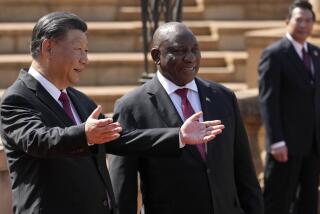A Summit to Legitimize a Corrupt Regime? : Africa: American participants in Gabon should ask hard questions about human rights.
About 600 prominent African-Americans are to gather today for the “Second African African-American Summit” in Gabon, a Central African state on the brink of bankruptcy and popular rebellion.
Two years ago, the African-American delegation to the first such summit, held in the Ivory Coast, was used as a public relations prop by authoritarian African leaders. As African-American conferees head toward Gabon, many Africans wonder whether they will again be used.
Upon formal independence from France in 1960, Gabon, the size of Connecticut, possessed the greatest economic potential in black Africa. With a small population and rich in oil and other resources, Gabon appeared destined for prosperity.
Yet today, Gabon is essentially bankrupt. Corruption and mismanagement have impoverished the people and saddled the country with the world’s highest per capita indebtedness. Income from the 1970s oil boom disappeared into private bank accounts, profligate projects like the 1977 Organization of African Unity summit and President Omar Bongo’s $139-million palace in Libreville.
In mid-April, Gabonese took to the streets, demanding restoration of water and electricity, which had been shut off for about six months as the bankrupt country’s infrastructure crumbled. Bongo’s presidential guard brutally suppressed the demonstrations, killing several people.
Bongo will seek a fifth seven-year term in Gabon’s first multiparty presidential election in December. What better opportunity to burnish his image than the summit? The U.S. delegation reads like a “Who’s Who” of African-Americans. Organizers say it will include Virginia Gov. Douglas Wilder, Commerce Secretary Ron Brown, the Rev. Jesse Jackson, Coretta Scott King and Joseph Lowery.
The summit’s emphasis is on building business links with Africa. Unfortunately, these have served mostly to bolster corrupt leaders across Africa. African-Americans would best help their black brothers and sisters by pressing the transcendent issues of freedom and open government.
An opportunity for African-Americans to promote African democratization was squandered two years ago when Ivory Coast President Felix Houphouet-Boigny hosted the “First African African-American Summit.” Participants gathered at the president’s home town of Yamassoukrou, site of the world’s largest Catholic basilica--erected at a cost of at least $360 million, in a country with an average annual per capita income of only $1,381.
The African-Americans in Yamassoukrou had nothing but praise for the African leaders who came for feasts and photo opportunities. There wasn’t a word about the murder of more than 80 pro-democracy demonstrators the week before in neighboring Mali, or a murmur about the 26 missing pro-democracy demonstrators just dredged from the Lome Lagoon in nearby Togo. One of the corpses was a woman with her baby still strapped to her back.
Benjamin Hooks, then-director of the NAACP, was quoted at the time as saying, “There is little black Americans could or should do directly to foster or affect political change in sub-Saharan Africa . . . I don’t think it is our business to meddle in their affairs.”
As delegates were being guided through Yamassoukrou, a citizen asked: “Why have you black Americans let us down?”
African-Americans in Gabon should ponder this. They ought not to allow themselves to be used by Bongo. At this summit, they should instead reinforce the democratic values that most Africans hold as America’s most admirable quality.
More to Read
Sign up for Essential California
The most important California stories and recommendations in your inbox every morning.
You may occasionally receive promotional content from the Los Angeles Times.










